外教社大学英语精读第三册unit3原文+翻译+课后翻译
大学英语精读3课文(第三版)_中英文对照
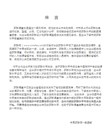
Text Book 3Unit 1TextA young man finds that strolling along the streets without an obvious purpose can lead to trouble with the law. One misunderstanding leads to another until eventually he must appear in court for trial……一个青年发现,在大街上毫无明显目的地游逛会招致警方的责罚。
误会一个接一个发生,最终他只得出庭受审……A Brush with the Law与警察的一场小冲突I have only once been in trouble with the law. 我平生只有一次跟警方发生纠葛。
The whole process of being arrested and taken to court was a rather unpleasant experience at the time, but it makes a good story now. 被捕和出庭的整个过程在当时是一件非常不愉快的事,但现在倒成了一篇很好的故事。
What makes it rather disturbing was the arbitrary circumstances both of my arrest and my subsequent fate in court. 这次经历令人可恼之处在于围绕着我的被捕以及随后庭上审讯而出现的种种武断专横的情况。
It happened in February about twelve years ago. 事情发生在大约12年前,其时正是2月。
I had left school a couple of months before that and was not due to go to university until the following October. 几个月前我中学毕业了,但上大学要等到10月。
大学英语精读3课后翻译

UNIT 11.讲话人〔 spokesman〕明确表示总统在任何状况下都不会撤消〔 The spokesman made it clear that the President would not cancel〕此次旅游。
cancel the trip under anycircumstances.2.杰克对书架上那些书一本也不认识,因此他的选择是很任意的。
Jack didn't know anything about any of the books on the bookshelf, so his choice wasquite arbitrary.3.随后发生的那些事件再次证了然我的猜忌〔suspicions〕是对的。
(Confirm)The subsequent events confirmed my suspicions once again.4.我以为我们应当鼓舞中学生在暑期找暂时工作。
I think we should encourage high school students to find temporary jobs / employmentduring their summer holidays.5.令我们惊讶的是,这位常被赞为十分正直的州长〔governor〕居然是个赃官〔corrupt official〕。
To our surprise, the governor who had often been praised for his honesty turned out to bea corrupt official.6.少量工人获取提高〔be promoted〕,与此同时却有数百名工人被辞退。
A few workers were promoted, but meanwhile hundreds of workers were dismissed.7.假如有机遇,约翰或许已成为一位优异的画家了。
大学英语第三册UNIT3全文翻译对照

The land of the lock1. Years ago in American, it was customary for families to leave their doors unlocked, day and night. In this essay, Greene regrets that people can no longer trust each other and have to resort to elaborate security system to protect themselves and their the author is writing his opinion, he uses many examples to reinforce his ideas and to prove his thesis. 几年前在美国,许多美国家庭的门通常都是日夜不上锁的。
在本文中,格林遗憾地指出人们已经不再彼此信任,不得不求助于各种复杂的安全设备来保护自身及其贵重物品。
作者在提出自己观点的同时,举出了大量的事例来证实和强调自己的观点;2. In the house where i grow up, it was our custom to leave the front door on the latch at night. I don't know if that was a local term or if is universal;"on the latch"meant the door was closed but not locked . None of us carried keys the last one in for the evening would close up,and that was it. 在我长大成人的家里,我们的习惯是晚上把前门闩上。
大学英语精读第三册123456单元课文翻译

Unit 1一个年轻人发现,在街上漫无目的的闲逛也会带来涉及法律上的麻烦。
一种误解导致另一种误解,直到最终他必须在法庭上接受审判…….法律小冲突我平生只有一次陷入与法律的冲突。
被捕与被带上法庭的整个经过在当时是一种令人极不愉快的经历,但现在这却成为一个好故事的素材。
尤其令人恼怒的是我被捕及随后在法庭上受审期间的种种武断情形。
事情发生在十二年前的二月,那是我中学毕业已经几个月了,但是要等到十月份才能上大学,所以当时我仍在家中。
一天上午,我来到离我住地不远的伦敦郊区的里士满,那是我正在找一份临时的工作,一边攒些钱去旅游。
由于天体晴朗,有没有什么急事,我便悠然自得的看看窗店橱窗,逛逛公园,有时干脆停下来四处观望。
一定是这种显然无所事事的样子使我倒了霉。
事情发生在十一点半左右,当我在当地图书馆谋之未成,刚从那里出来,就看见一个人从马路对面走过来,显然是想跟我说话。
我愿意为他是要问我时间。
想不到他说他是警察,要逮捕我。
开始我还以为这是个玩笑。
但紧接着又来了一个穿着警服的警察,这下我无可置疑了。
“为什么抓我?”我问。
“四处游荡,有作案嫌疑,”他说。
“做什么案?”我又问。
“偷东西,”他说。
“偷什么”我追问。
“牛奶瓶”他说,表情极端严肃。
“噢,”事情是这样的,这一带经常发生小偷小摸的案件,尤其是从门前台阶上偷走牛奶瓶。
接着,我犯了个大错误,那是我才十九岁,留着一头乱蓬蓬的长发,自以为是六十年代“青年反主流文化”的一员。
因此,我想对此表现出一副冷漠,满不在乎的态度,于是用一种很随便的无所谓的腔调说:“你们跟我多久了?”这样一来,我在他们眼里,我是惯于此种情形的,这又使他们确信我是一个彻头彻尾的坏蛋。
几分钟后来了一辆警车。
“坐到后面去,”他们说:“把手放在椅背上,不许乱动。
”他俩分别坐在我的左右,这下可不是闹着玩的了。
在警察局,他们审问了我好几个小时。
我继续装着老于世故,对此种事习以为常的样子。
当他们问我一直在干什么事时,我告诉他们我在找工作。
大学英语第三册UNIT3全文翻译对照

The land of the lock1. Years ago in American, it was customary for families to leave their doors unlocked, day and night. In this essay, Greene regrets that people can no longer trust each other and have to resort to elaborate security system to protect themselves and their valuables.Although the author is writing his opinion, he uses many examples to reinforce his ideas and to prove his thesis.几年前在美国,许多美国家庭的门通常都是日夜不上锁的。
在本文中,格林遗憾地指出人们已经不再彼此信任,不得不求助于各种复杂的安全设备来保护自身及其贵重物品。
作者在提出自己观点的同时,举出了大量的事例来证实和强调自己的观点;2. In the house where i grow up, it was our custom to leave the front door on the latch at night. I don't know if that was a local term or if is universal;"on the latch"meant the door was closed but not locked . None of us carried keys the last one in for the evening would close up,and that was it. 在我长大成人的家里,我们的习惯是晚上把前门闩上。
大学英语精读-Unit3-课后练习答案译文-keystoAR1

Home
7. If someone affirmed something, did they (a) show they respect and approve of it, or (b) not respect or approve of it?
Back
While-reading Activities
√
√
4. Is a radical idea (a) traditional and widely accepted , or (b) new and different?
Home Back
√
While-reading Activities
Dealing with unfamiliar words
Back
While-reading Activities
Dealing with unfamiliar words
Answer the questions about the words and expressions. 1. If you thwart something, do you (a) stop it, or (b) encourage it? 2. If there is a dearth of something, is there (a) a lot of it, or (b) not enough? 3. Does unmitigated encouragement suggest (a) complete positive,
大学英语精读:第三册UNIT3

Every teacher probably asks himself time and again: What are the reasons for choosing teaching as a career? Do the rewards teaching outweigh the trying comments? Answering these questions is not a simple task. Let's see what the author says.Why I TeachPeter G. Beidler Why do you teach? My friend asked the question when I told him that I didn't want to be considered for an administrative position. He was puzzled that I did not want what was obviously a "step up" toward what all Americans are taught to want when they grow up: money and power. Certainly I don't teach because teaching is easy for me. Teaching is the most difficult of the various ways I have attempted to earn my living: mechanic, carpenter, writer. For me, teaching is a red-eye, sweaty-palm, sinking-stomach profession. Red-eye, because I never feel ready to teach no matter how late I stay up preparing. Sweaty-palm, because I'm always nervous before I enter the classroom, sure that I will be found out for the fool that I am. Sinking-stomach, because I leave the classroom an hour later convinced that I was even more boring than usual. Nor do I teach because I think I know answers, or because I have knowledge I feel compelled to share. Sometimes I am amazed that my students actually take notes on what I say in class! Why, then, do I teach? I teach because I like the pace of the academic calendar. June, July, and August offer an opportunity for reflection, research and writing. I teach because teaching is a profession built on change. When the material is the same, I change —— and, more important, my students change. I teach because I like the freedom to make my own mistakes, to learn my own lessons, to stimulate myself and my students. As a teacher, I'm my own boss. If I want my freshmen to learn to write by creating their own textbook, who is to say I can't? Such courses may be huge failures, but we can all learn from failures. I teach because I like to ask questions that students must struggle to answer. The world is full of right answers to bad questions. While teaching, I sometimes find good questions. I teach because I enjoy finding ways of getting myself and my students out of the ivory tower and into the real world. I once taught a course called "Self-Reliance in a Technological Society." My 15 students read Emerson, Thoreau, and Huxley. They kept diaries. They wrote term papers. But we also set up a corporation, borrowed money, purchased a run-down house and practiced self-reliance by renovating it. At the end of the semester, we would the house, repaid our loan, paid or taxes, and distributed the profits among the group. So teaching gives me pace, and variety, and challenge, and the opportunity to keep on learning. I have left out, however, the most important reasons why I teach. One is Vicky. My first doctoral student, Vicky was an energetic student who labored at her dissertation on a little-known 14th century poet. She wrote articles and sent them off to learned journals. She did it all herself, with an occasional nudge from me. But I was there when she finished her dissertation, learned that her articles were accepted, got a job and won a fellowship to Harvard working on a book developing ideas she'd first had as my student. Another reason is George, who started as an engineering student, then switched to English because he decided he liked people better than things. There is Jeanne, who left college, but was brought back by her classmates because they wanted her to see the end of the self-reliance house project. I was here when she came back. I was there when she told me that she later became interested in the urban poor and went on to become a civil rights lawyer. There is Jacqui, a cleaning woman who knows more by intuition than most of us learn by analysis. Jacqui has decided to finish high school and go to college. These are the real reasons I teach, these people who grow and change in front of me. Being a teacher is being present at the creation, when the clay begins to breathe. A "promotion" out of teaching would give me money and power. But I have money. I get paid to do what I enjoy: reading, talking with people, and asking question like, "What is the point of being rich?" And I have power. I have the power to nudge, to fan sparks, to suggest books, to point out a pathway. What other power matters? But teaching offers something besides money and power: it offers love. Not only the love of learning and of books and ideas, but also the love that a teacher feels for that rare student who walks into a teacher's life and begins to breathe. Perhaps love is the wrong word: magic might be better. I teach because, being around people who are beginning to breathe, I occasionally find myself catching my breath with them. NEW WORDS administrative a. of the management of affairs ⾏政的,管理的 administration n. 管理(部门),⾏政(机关) puzzle vt. fill with doubt and confusion 使迷惑 step (-) up n. promotion; increase in size, speed, etc. mechanic n. skilled workman, esp. one who uses or repairs machines and tools 机械⼯;机修⼯ sweaty a. covered with sweat, sweating palm a. ⼿掌 profession n. occupation, esp. one requiring special training, such as law, medicine, or teaching convince vt. make (sb.) feel certain; cause (sb.) to realize compel vt. force (sb. or sth. to do sth.) pace n. rate or speed of development, or in walking, etc. 速度;步速 calendar n. ⽇程表,⽇历 opportunity n. favourable occasion or chance reflection n. careful thinking; consideration 深思;考虑 reflect vi. stimulate vt. encourage; excite 刺激;激励 freshman n. student in his first year at a college or university failure n. a person, attempt, or thing that fails; lack of success ivory n. 象⽛ ivory tower n. place or condition of retreat from the world of action into a world of ideas and dreams 象⽛塔 self-reliance n. ability to do things and make decisions by oneself 依靠⾃⼰;⾃⼒更⽣ reliance n. trust, confidence; dependence 信赖;信⼼;依靠 technological a. of or related to technology 技术的 corporation n. (AmE)有限公司 run-down a. old and broken or in bad condition renovate vt. restore (old buildings, oil paintings, etc.) to a former, better state 修复,修整 semester n. (AmE) either of the two periods into which a school year is divided; term 学期 repay。
大学英语精读第三版第三册课文翻译介绍
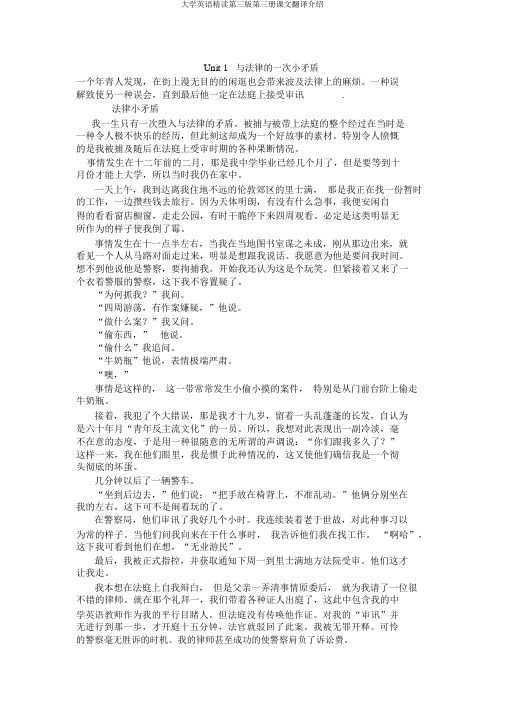
Unit 1与法律的一次小矛盾一个年青人发现,在街上漫无目的的闲逛也会带来波及法律上的麻烦。
一种误解致使另一种误会,直到最后他一定在法庭上接受审讯.法律小矛盾我一生只有一次堕入与法律的矛盾。
被捕与被带上法庭的整个经过在当时是一种令人极不快乐的经历,但此刻这却成为一个好故事的素材。
特别令人愤慨的是我被捕及随后在法庭上受审时期的各种果断情况。
事情发生在十二年前的二月,那是我中学毕业已经几个月了,但是要等到十月份才能上大学,所以当时我仍在家中。
一天上午,我到达离我住地不远的伦敦郊区的里士满,那是我正在找一份暂时的工作,一边攒些钱去旅行。
因为天体明朗,有没有什么急事,我便安闲自得的看看窗店橱窗,走走公园,有时干脆停下来四周观看。
必定是这类明显无所作为的样子使我倒了霉。
事情发生在十一点半左右,当我在当地图书室谋之未成,刚从那边出来,就看见一个人从马路对面走过来,明显是想跟我说话。
我愿意为他是要问我时间。
想不到他说他是警察,要拘捕我。
开始我还认为这是个玩笑。
但紧接着又来了一个衣着警服的警察,这下我不容置疑了。
“为何抓我?”我问。
“四周游荡,有作案嫌疑,”他说。
“做什么案?”我又问。
“偷东西,”他说。
“偷什么”我追问。
“牛奶瓶”他说,表情极端严肃。
“噢,”事情是这样的,这一带常常发生小偷小摸的案件,特别是从门前台阶上偷走牛奶瓶。
接着,我犯了个大错误,那是我才十九岁,留着一头乱蓬蓬的长发,自认为是六十年月“青年反主流文化”的一员。
所以,我想对此表现出一副冷淡,毫不在意的态度,于是用一种很随意的无所谓的声调说:“你们跟我多久了?”这样一来,我在他们眼里,我是惯于此种情况的,这又使他们确信我是一个彻头彻底的坏蛋。
几分钟以后了一辆警车。
“坐到后边去,”他们说:“把手放在椅背上,不准乱动。
”他俩分别坐在我的左右,这下可不是闹着玩的了。
在警察局,他们审讯了我好几个小时。
我连续装着老于世故,对此种事习以为常的样子。
当他们问我向来在干什么事时,我告诉他们我在找工作。
大学英语精读第3册第3课课文翻译及课后答案
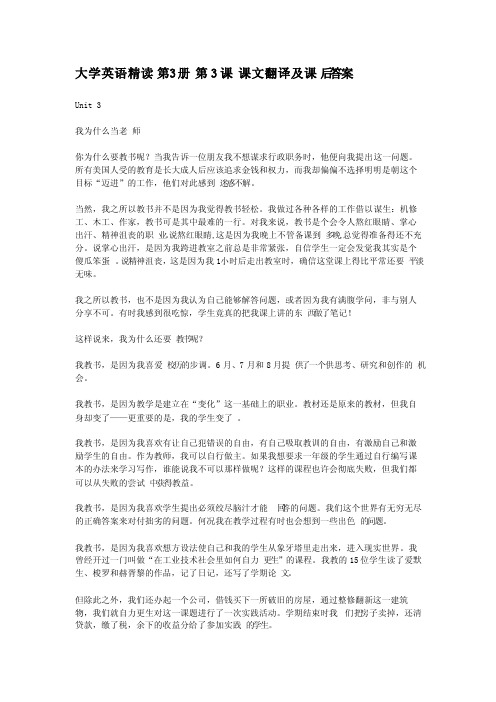
大学英语精读第3册第3课课文翻译及课后答案Unit 3我为什么当老师你为什么要教书呢?当我告诉一位朋友我不想谋求行政职务时,他便向我提出这一问题。
所有美国人受的教育是长大成人后应该追求金钱和权力,而我却偏偏不选择明明是朝这个目标“迈进”的工作,他们对此感到迷惑不解。
当然,我之所以教书并不是因为我觉得教书轻松。
我做过各种各样的工作借以谋生:机修工、木工、作家,教书可是其中最难的一行。
对我来说,教书是个会令人熬红眼睛、掌心出汗、精神沮丧的职业。
说熬红眼睛,这是因为我晚上不管备课到多晚,总觉得准备得还不充分。
说掌心出汗,是因为我跨进教室之前总是非常紧张,自信学生一定会发觉我其实是个傻瓜笨蛋。
说精神沮丧,这是因为我1小时后走出教室时,确信这堂课上得比平常还要平淡无味。
我之所以教书,也不是因为我认为自己能够解答问题,或者因为我有满腹学问,非与别人分享不可。
有时我感到很吃惊,学生竟真的把我课上讲的东西做了笔记!这样说来,我为什么还要教书呢?我教书,是因为我喜爱校历的步调。
6月、7月和8月提供了一个供思考、研究和创作的机会。
我教书,是因为教学是建立在“变化”这一基础上的职业。
教材还是原来的教材,但我自身却变了——更重要的是,我的学生变了。
我教书,是因为我喜欢有让自己犯错误的自由,有自己吸取教训的自由,有激励自己和激励学生的自由。
作为教师,我可以自行做主。
如果我想要求一年级的学生通过自行编写课本的办法来学习写作,谁能说我不可以那样做呢?这样的课程也许会彻底失败,但我们都可以从失败的尝试中获得教益。
我教书,是因为我喜欢学生提出必须绞尽脑汁才能回答的问题。
我们这个世界有无穷无尽的正确答案来对付拙劣的问题。
何况我在教学过程有时也会想到一些出色的问题。
我教书,是因为我喜欢想方设法使自己和我的学生从象牙塔里走出来,进入现实世界。
大学英语精读第三册翻译

大学英语精读第三册翻译篇一:大学英语精读第三册课文翻译Unit 1Te_tA young man finds that strolling along the streets without an obvious purpose can lead to trouble with the law. One misunderstanding leads to another until eventually he must appear in court for trial……一个青年发现,在大街上毫无明显目的地游逛会招致警方的责罚. 误会一个接一个发生,最终他只得出庭受审……A Brush with the Law与警察的一场小冲突I have only once been in trouble with the law. 我平生只有一次跟警方发生纠葛.The whole process of being arrested and taken to court was a rather unpleasant e_perience at the time, but it makes a good story now. 被捕和出庭的整个过程在当时是一件非常不愉快的事,但现在倒成了一篇很好的故事.What makes it rather disturbing was the arbitrary circumstances both of my arrest and my subsequent fate in court. 这次经历令人可恼之处在于围绕着我的被捕以及随后庭上审讯而出现的种种武断专横的情况.It happened in February about twelve years ago. 事情发生在大约_年前,其时正是2月.I had left school a couple of months before that and was not due to go to university until the following October. 几个月前我中学毕业了,但上大学要等到_月.I was still living at home at the time. 当时我还在家中居住.One morning I was in Richmond, a suburb of London near where I lived. 一天早晨,我来到里士满.这里是伦敦的一个郊区,离我住的地方不远.I was looking for a temporary job so that I could save up some moneyto go travelling. 我在寻找一份临时工作,以便积些钱去旅游.As it was a fine day and I was in no hurry, I was taking my time, looking in shop windows, strolling in the park, and sometimes just stopping and looking around me. 由于天气晴朗,当时又无急事,我便慢悠悠看看橱窗,逛逛公园.有时干脆停下脚步,四处张望.It must have been this obvious aimlessness that led to my downfall. 现在看来,一定是这种明显的毫无目的的游逛,使我倒了霉.It was about half past eleven when it happened. 事情发生在_点半钟光景.I was just walking out of the local library, having unsuccessfully sought employment there, when I saw a man walking across the road with the obvious intention of talking to me. 我在当地图书馆谋职未成,刚刚走出来,便看到一个人穿越马路,显然是要来跟我说话.I thought he was going to ask me the time. Instead, he said he was a police officer and he was arresting me. 我以为他要问我时间,不料他说他是警官,要逮捕我.At first I thought it was some kind of joke. But then another policeman appeared, this time in uniform, and I was left in nodoubt. 起先我还以为这是在开玩笑,但又一个警察出现在我的面前,这次是位身着警服的,这一下使我确信无疑了. But what for? I asked. 〝为什么要抓我?〞我问道.Wandering with intent to commit an arrestable offence, he said. 〝到处游荡,企图作案,〞他说.What offence? I asked. 〝作什么案?〞我又问.Theft, he said. 〝偷窃,〞他说.Theft of what? I asked. 〝偷什么?〞我追问.Milk bottles, he said, and with a perfectly straight face too! 〝牛奶瓶,〞他板着面孔说道.Oh, I said. 〝噢,〞我说.It turned out there had been a lot of petty thefts in the area, particularly that of stealing milk bottles from doorsteps. 事情原来是这样的,在这一地区多次发生小的扒窃案,特别是从门前台阶上偷走牛奶瓶.Then I made my big mistake. 接着,我犯了一个大错误.At the time I was nineteen, had long untidy hair, and regarded myself as part of the si_ties youth countercultrue. 其时我年方_,留一头蓬乱的长发,自认为是60年代〝青年反主流文化〞的一员.As a result, I want to appear cool and unconcerned with the incident, so I said, How long have you been following me? in the most casual and conversational tone I could manage. 所以我想装出一副冷漠的.对这一事件满不在乎的样子.于是我尽量用一种漫不经心的极其随便的腔调说,〝你们跟踪我多久啦?〞I thus appeared to them to be quite familiar with this sort of situation, and it confirmed them in their belief that I was a thoroughly disreputable character. 这样一来,在他们眼里,我就像是非常熟悉这一套的了,也使他们更加确信我是一个地地道道的坏蛋.A few minutes later a police car arrived. 几分钟后,开来了一辆警车. Get in the back, they said. Put your hands on the back of the front seat and don t move them. 〝坐到后面去,〞他们说.〝把手放到前排座位的靠背上,不准挪动.〞They got in on either side of me. It wasn t funny any more. 他们分别坐在我的两边.这可再也不是闹着玩的了. At the police station they questioned me for several hours. 在警察局,他们审讯了我好几个小时.I continued to try to look worldly and au fait with the situation. 我继续装成老于世故.对这种事习以为常.When they asked me what I had been doing, I told them I d been looking for a job. 当他们问我在干什么时,我告诉他们在找工作.Aha, I could see them thinking, unemployed . 〝啊,〞我可以想象他们在想,〝果然是个失业的家伙.〞Eventually, I was officially charged and told to report to Richmond Magistrates Court the following Monday. Then they let me go. 最后,我被正式起诉,并通知我下周一到里士满地方法庭受审.随后他们让我离开.I wanted to conduct my own defence in court, but as soon as my father found out what had happened, he hired a very good solicitor. 我想在法庭上作自我辩护,但父亲知道这事后,马上请了一位高明的律师.We went along that Monday armed with all kinds of witnesses, including my English teacher from school as a character witness. 我们星期一出庭的时候,带了各种各样的证人,其中包括我中学的英语老师,做我人品的见证人. But he was never called on to give evidence. My trial didn t get that far. 但结果法庭没有叫他作证.我的〝审判〞没有进行到那一步.The magistrate dismissed the case after fifteen minutes. 开庭_分钟,法官就驳回了对我的指控.I was free. The poor police had never stood a chance. 我无罪获释.可怜的警方一点儿赢的机会都没有.The solicitor even succeeded in getting costs awarded against the police. 我的律师甚至让法庭责成警方承担了诉讼费用.And so I do not have a criminal record. 这样,我的履历上没有留下犯罪的记录.But what was most shocking at the time was the things my release from the charge so clearly depended on. 但当时最令人震惊的,是那些显然导致宣布我无罪的证据.I had the right accent, respectable middle-class parents in court, reliable witnesses, and I could obviously afford a very good solicitor. 我讲话的口音〝表明我教养良好〞,到庭的有体面的中产阶级的双亲,有可靠的证人,还有,我显然请得起一名很好的律师.Given the obscure nature of the charge, I feel sure that if I had come from a different background, and had really been unemployed, there is every chance that I would have been found guilty. 从对我指控的这种捕风捉影的做法来看,我肯定,如果我出身在另一种背景的家庭里,并且真的是失了业的话,我完全可能被判有罪.While asking for costs to be awarded, my solicitor s case quite obviously revolved around the fact that I had a brilliant academic record . 当我的律师要求赔偿诉讼费时,他公然把辩护的证据建立在我〝学业优异〞这一事实上.Meanwhile, just outside the courtroom, one of the policemen who had arrested me was gloomily complaining to my mother that another youngster had been turned against the police. 与此同时,就在审判室外面,一位抓我的警察正在沮丧地向我母亲抱怨,说是又一个小伙子要跟警察作对了.You could have been a bit more helpful when we arrested you, he said to me reproachfully. 他带着责备的口气对我说,〝我们抓你的时候,你本可以稍微帮点忙的.〞What did he mean? 他说这话什么意思?Presumably that I should have looked outraged and said something like, Look here, do you know who you re talking to? I am a highly successful student with a brilliant academic record. How dare you arrest me! 大概是说我本该显出愤愤不平的样子,并说,〝喂,留神点,你知道你在跟谁说话?我是学业出众的高材生.你敢抓我!〞Then they, presumably, would have apologized, perhaps even taken off their caps, and let me on my way. 那样一来,他们或许会向我道歉,说不定还会脱帽致意,让我走开呢.NEW WORDSbrushn. brief fight or encounter 小冲突;小接触processn. course; method, esp. one used in manufacture 过程;制作法arbitrarya. based on one s own opinion only, not on reason 任意的;武断的circumstancen. (usu. pl.) conditions, facts, etc. connected with an event or person 情况,环境subsequenta. following, later 随后的,接下去的faten. what will happen or happened to sb. or sth. 命运duea. e_pected; supposed (to) 预期的;约定的;到期的temporarya. lasting only for a limited time 暂时的strolla. walk at leisure 散步,闲逛obviousa. easily seen or understood; clear 明显的,显而易见的downfalln. ruin 垮台;衰落employmentn. one s regular work or occupation; job 职业;工作wandervi. move about without a purpose 闲逛;漫游commitvt. do (sth. wrong, bad, or unlawful)干(坏事),犯(错误.罪)arrestablea. deserving to be arrestedoffence (AmE offense)n. crime; the hurting of feelings; something unpleasant 罪行;冒犯;不愉快的事straight facea face or e_pression that shows no emotion, humor, or thought 板着的脸pettya. small; unimportant 小的;不足道的doorstepn. a step in front of a doorregardvt. consider in the stated way 把……看作;把认为(as)counterculturen. a culture, esp. of the young who oppose the traditional standards and customs of their society 反主流文化 unconcerneda. not worried; untroubled; indifferent 无忧虑的;淡漠的casuala. careless; informal 漫不经心的,随便的conversationala. of or commonly used in talking 会话(用)的confirmvt. make certain; support 证实,肯定;确定beliefn. something believed; trust 相信;信念;信仰thoroughlyad. completely; in every way 完全地,彻底地thorough a.disreputablea. having or showing a bad character; having a bad name 声名狼籍的 worldlya. e_perienced in the ways of society 老于世故的au faita. (F) familiar 熟悉的;精通的ahaint. a cry of surprise, satisfaction, etc. 啊哈!magistraten. civil officer acting as a judge in the lowest courts 地方法官篇二:大学英语精读第三册课文翻译第一课与法律的小摩擦我平生只有一次跟警方发生纠葛.被捕和出庭的整个过程在当时是一件非常不愉快的事,但现在倒成了一篇很好的故事.这次经历令人可恼之处在于围绕着我的被捕以及随后庭上审讯而出现的种种武断专横的情况.I have only once been in trouble with the law. The whole process of being arrested and taken to court(法院) was a rather unpleasant e_perience at the time, but it makes a good story now. What makes it rather disturbing was the arbitrary circumstances both of my arrest and my subsequent fate in court.事情发生在大约_年前,其时正是2月.几个月前我中学毕业了,但上大学要等到_月.当时我还在家中居住.It happened in February about twelve years ago. I had left school a couple of months before that and was not due to go to university until the following October. I was still living at home at the time.一天早晨,我来到里士满.这里是伦敦的一个郊区,离我住的地方不远⊙我在寻找一份临时工作,以便积些钱去旅游.由于天气晴朗,当时又无急事,我便慢悠悠看看橱窗,逛逛公园.有时千脆停下脚步,四处张望.现在看来,一定是这种明显的毫无回的的游逛,使我倒了霉. One morning I was in Richmond, a suburb of London near where Ilived. I was looking for a temporary job so that I could save up some moneyto go traveling. As it was a fine day and I was in no hurry, I was taking my time, looking in shop windows, strolling in the park, and sometimesjust stopping and looking around me. It must have been this obvious aim-lessness that led to my downfall.事情发生在_点半钟光景.我在当地图书馆谋职未成,刚刚走出来,便看到一个人穿越马路,显然是要来跟我说话.我以为他要问我时间,不料他说他是警官,要逮捕我.起先我还以为这是在开玩笑,但又一个警察出现在我的面前,这次是位身着警服的,这一下使我确信无疑了.It was about half past eleven when it happened. I was just walking out of the local library, having unsuccessfully sought employment there, whenI saw a man walking across the road with the obvious intention of talkingto me. I thought he was going to ask me the time. Instead, he said he wasa police officer and he was arresting me. At first I thought it was somekind of joke. But then another policeman appeared, this time in uniform, andwas left in no doubt.〝为什么要抓我?〞我问道.〝到处游荡,企图作案,〞他说.〝作什么案?〞我又问.〝偷窃,〞他说.〝偷什么?〞我追问.〝牛奶瓶,〞他板着面孔说道.〝噢,〞我说.事情原来是这样的,在这一地区多次发生小的扒窃案,特别是从门前台阶上偷走牛奶瓶. It turned out there had been a lot of petty thefts in the area, particularly that of stealing milk bottles from doorsteps.接着,我犯了一个大错误.其时我年方_,留一头蓬乱的长发,自认为是60年代〝青年反主流文化〞的一员.所以我想装出一副冷漠的.对这一事件满不在乎的样子.于是我尽量用一种漫不经心的极其随便的腔调说,〝你们跟踪我多久啦?〞这样一来,在他们眼里,我就像是非常熟悉这一套的了,也使他们更加确信我是一个地地道道的坏蛋.Then I made my big mistake. At the time I was nineteen, had long untidy hair, and regarded myself as part of the si_ties ` youth counterculture .As a result, I wanted to appear cool and unconcerned with the incident, soI said, ` How long have you been following me? in the most casual and conversational tone I could manage. I thus appeared to them to be quite familiar with this sort of situation, and it confirmed them in their belief thatI was a thoroughly disreputable character.几分钟后,开来了一辆警车.〝坐到后面去,〞他们说.〝把手放到前排座位的靠背上,不准挪动.〞他们分别坐在我的两边.这可再也不是闹着玩的了.在警察局,他们审讯了我好几个小时.我继续装成老于世故.对这种事习以为常.当他们问我在千什么时,我告诉他们在找工作.〝啊,〞我可以想见他们在想,〝果然是个失业的家伙.〞 At the police station they questioned me for several hours. I continuedto try to look worldly and au fait with the situation. When they asked mewhat I had been doing, I told them I d been looking for a job. ` Aha, Icould see them thinking, `unemployed .最后,我被正式指控,并通知我下周一到里士满地方法庭受审.随后他们让我离开.我想在法庭上作自我辩护,但父亲知道这事后,马上请了一位高明的律师.我们星期一出庭的时候,带了各种各样的证人,其中包括我中学的英语老师,作我人品的见证人.但结果法庭没有叫他作证.我的〝审判〞没有进行到那一步.开庭 1 5分钟,法官就驳回了对我的指控.我无罪获释.可怜的警方败诉,我的律师甚至让法庭责成警方承担了诉讼费用. I wanted to conduct my own defense in court, but as soon as my fatherfound out what had happened, he hired a very good solicitor. We went along that Monday armed with all kinds of witnesses, including my Englishteacher from school as a character witness. But he was never called on togive evidence. My `trial didn t get that far. The magistrate dismissed thecase after fifteen minutes. I was free. The poor police had never stood achance. The solicitor even succeeded in getting costs awarded against thepolice.这样,我的履历上没有留下犯罪的记录.但当时最令人震惊的,是那些显然导致宣布我无罪的证据.我讲话的口音〝表明我受过良好教养〞,到庭的有体面的中产阶级的双亲,有可靠的证人,还有,我显然请得起一名很好的律师.从对我指控的这种捕风捉影的做法来看,我肯定,如果我出身在另一种背景的家庭里,并且真的是失了业的话,我完全可能被判有罪.当我的律师要求赔偿诉讼费时,他公然把辩护的证据建立在我〝学业优异〞这一事实上. And so I do not have a criminal record. But what was most shocking atthe time was the things my release from the charge so clearly depended on.I had the `right accent, respectable middle-class parents in court, reliablewitnesses, and I could obviously afford a very good solicitor. Given the obscurenature of the charge, I feel sure that if I had come from a different background,and had really been unemployed, there is every chance that I would have been found guilty. While asking for costs to be awarded, my solicitor s casequite obviously revolved around the fact that I had a brilliant academicrecord .与此同时,就在审判室外面,一位抓我的警察正在沮丧地向我母亲抱怨,说是又一个小伙子要跟警察作对了.他带着责各的口气对我说,〝我们抓你的时候,你本可以稍微帮J点忙的.〞 Meanwhile, just outside the courtroom, one of the policemen who hadarrested me was gloomily complaining to my mother that another youngsterhad been turned against the police. You could have been a bit more helpfulwhen we arrested you, he said to me reproachfully.他说这话什么意思?大概是说我本该显出愤愤不平的样子,并说,〝喂,留神,点,你知道你在跟谁说话?我是学业出众的高材生.你敢抓我!〞那样一来,他们或许会向我道歉,说不定还会脱帽致意,让我走开呢.What did he mean? Presumably that I should have looked outraged and saidsomething like, Look here, do you know who you re talking to? I am a highlysuccessful student with a brilliant academic record. How dare you arrest me!Then they, presumably, would have apologized, perhaps even taken offtheir caps, and let me on my way.第二单元不肯告发的女人〝我从来就不恨北方佬,我所恨的只是战争??〞我的姨婆贝蒂一讲起她的故事来,总是用这样的话开头.她的故事,在我还小的时候就听过多遍.姨婆住在弗吉尼亚贝利维尔一所旧房子里.每逢我们一家去看望她,她都要讲讲她的故事,那时姨婆贝蒂都快80岁了.但我可以想象到故事里她的容貌——刚刚_岁,长着一双亮晶晶的蓝眼睛,非常漂亮.贝蒂?范?米特完全有理由憎恨内战.她有个兄弟死在葛底斯堡战场上,还有一位当了俘虏.接着,她年轻的丈夫詹姆斯——南部邦联的一名军官——也被俘虏,关到某地一所不为人知的俘虏营里.9月下旬的一个热天,贝蒂家以前的奴隶迪克?朗纳来到贝蒂处,告诉她一件奇怪的事.他在察看离范?米特家半英里处的一所农舍时,本以为那是所空房子,但在屋里,他听到有人低声呻吟.他随着呻吟声来到顶楼,发现了一名受伤的联邦政府士兵,在他的身边放着一支步枪.贝蒂姨婆跟我讲起她第一次看到那个身着污渍斑斑的蓝军服.长着胡须的人时,她总是说,〝我就像步入一场梦境:可怕的绷带,吓人的气味.孩子,那才是战争的真实写照:没有军号,也没有战旗.有的只是痛苦和污秽,无益与死亡.〞在贝蒂?范?米特眼里,这个伤兵不是敌人,而是一个受苦受难的人.她给他水喝,并设法擦净他那可怕的伤口.然后她走出农舍,到外面呼吸一点清凉的空气,她倚在屋旁,想到她所见到的这一切——他那只打烂的右手,那条失去的左腿,真是恶心难忍.贝蒂在顶楼上找到的伤兵的证件,证实他的身份是第十一佛蒙特志愿军D连中尉亨利?比德尔,30岁.她知道应该把这个联邦政府军官的情况向南方邦联的军队报告,可是她也明白她不会那样做.她是这样向我解释的:〝我一直在想,他是不是在什么地方有一位妻子,等着他,盼着他,可又毫无音信——就像我一样.在我看来,唯一重要的事是让她的丈夫重新田到她的身旁.〞詹姆斯?范?米特的妻子慢慢地.耐心地.巧妙地.点燃了亨利?比德尔身上奄奄一息的生命火花.要说药品,她几乎没有.而她又不肯从南方邦联医院里极少的一点医药用品里去拿.但她尽其所有作了一切努力.当比德尔的体力有所恢复时,他向贝蒂叙说了他在佛蒙特韦斯菲尔德的妻子和子女的J晴况.当贝蒂讲起她的兄弟和詹姆斯时,比德尔也仔细倾听着.贝蒂姨婆总是跟我讲,〝我知道他的妻子一定在为他祈祷,就像我为詹姆斯祈祷一样.真奇怪,我和她的感情多么接近.〞山谷地带,_月的夜晚变得越来越冷.比德尔的伤田感染突然加剧.在迪克和他妻子詹尼的帮助下,贝蒂趁黑夜将这位联邦政府军官搬到她自家暖和的厨房上面的一个不易发现的阁楼上.但在第二天,比德尔发起高烧.贝蒂明白她必须求人帮助,否则他将会死去,因此找到她的家庭医生,多年的朋友格雷厄姆?奥斯本.奥斯本医生为比德尔作了检查,然后摇摇头说,希望甚微,除非能弄到合适的药品. 〝那好,〞贝蒂说.〝我到哈珀斯渡口北方军那儿去弄!〞医生说她想必疯了.联邦政府军的司令部在将近⒛英里之外,即使找到了北方军,他们也决不会相信她的话.〝我把证据带去,〞贝蒂说.她到阁楼上取下一份血迹斑斑的文件,上面盖着陆军部的官印.〝这是他最后一次晋升的记录,〞她说.〝我让他们看这个,他们一定会相信我.〞她叫医生写下所需药品的清单.次日一早,她就登程赶路.她驱车5个小时,马要休息时,她才停一停.当她终于到达哈珀斯渡口,找到司令官的时候,太阳都快落山了.约翰?D?史蒂文森将军听了她的叙述,但不信她的话.他说,〝夫人,我们已接到比德尔阵亡的报告.〞〝他还活着,〞贝蒂坚持说.〝不过,除非他得到单子上的药品,否则他就活不了多久了.〞〝好吧,〞将军最后说,〝我不想为了搞清这r点事,而拿一个巡逻队的生命去冒险.〞他转向一个下级军官说,〝你负责让范?米特太太得到这些药品.〞他对贝蒂的感谢并没有怎么理会,却说道,〝不管你讲的是真是假,你是一位勇敢的女性.〞有了贝蒂带回贝利维尔的药品,奥斯本医生才将比德尔从垂危之中拯救了过来._天之后,比德尔就能拄着迪克为他制作的拐杖一瘸一拐地行走了.〝我不能再这样连累你了,〞比德尔对贝蒂说道,〝我现在身体已经够好了,可以走了.我想尽早回去.〞于是,他们作了安排,由贝蒂的邻居和朋友萨姆先生用他的运货马车协助贝蒂将比德尔送交驻守在哈珀斯渡口的联邦政府军司令部.他们将贝蒂的马和萨姆先生的骡一起套上车.比德尔躺在一个装满干草的旧木箱内,他将步枪和拐杖放在身边.行程迟缓而漫长,差一点以灾难而告终.在离联邦政府军防线仅有1小时的路程时,突然出现了两个骑马的人.一个人举着手枪,逼着要钱.另一人将萨姆从车上拉了下来,贝蒂吓呆了,坐着一动不动.就在这时,一声枪响,拿手枪的歹徒应声倒地身亡.又一声枪响,另一个歹徒也躺倒地上.是比德尔开的枪!贝蒂看着他放下步枪,掸掉头发里的干草.〝上车吧,萨姆先生,〞他说道,〝我们赶路吧!〞在哈珀斯渡口,士兵们惊奇地盯着这位老农民和这位年轻的女子看.当缺了一条腿的联邦政府军官从装着干草的木箱里站起来时,他们更是惊愕不已.比德尔被派去华盛顿.在华盛顿,他把情况向陆军部长埃德温?M?斯坦顿作了汇报.斯坦顿给贝蒂写了一封感谢信,并签署了一项将詹姆斯?范?米特从战俘营释放的命令.可是首先必须找到詹姆斯.经过安排,由比德尔陪同贝蒂寻找她的丈夫.有文件记载,有个叫詹姆斯?范?米特的曾被送到俄亥俄的一个战俘营.可是当那些衣衫褴褛的俘虏们被带到贝蒂面前时,詹姆斯却不在里面.又查了一个俘虏营,结果也是一样.贝蒂?范?米特拼命抑制着一种令人战栗不已的恐惧感,她担心她的丈夫已经死去了.后来在特拉华堡,在靠近一排战俘的末尾处,一个高高个子的人从队伍里走了出来,蹒跚着扑到贝蒂怀里.贝蒂拥抱着他,泪流满面.拄着拐杖站立一旁的亨利?比德尔也流泪了. I never did hate the Yankees. All that I hated was the war...That s how my great-aunt Bettie began her story. I heard it many times as a child, whenever my family visited Aunt Bettie in the old house inBerryville, Virginia. Aunt Bettie was almost 80 years old then. But I couldpicture her as she was in the story she told me- barely _, pretty, with bright blue eyes.Bettie Van Metre had good reason to hate the Civil War. One of her brothers was killed at Gettysburg, another taken prisoner. Then her younghusband, James, a Confederate officer, was captured and sent to an un- known prison camp somewhere.One hot day in late September Dick Runner, a former slave, cameto Bettie with a strange report. He had been checking a farmhouse half a mile away from the Van Metre home, a farmhouse he thought wasempty. But inside, he heard low groans. Following them to the attic, he found a wounded Union soldier, with a rifle at his side.When Aunt Bettie told me about her first sight of the bearded man in the stained blue uniform, she always used the same words. It was like walking into a nightmare : those awful bandages, that dreadful smell. That s what war is really like, child: no bugles and banners. Just pain andfilth, futility and death.To Bettie Van Metre this man was not an enemy but rather a suffering human being. She gave him water and tried to clean his terrible wounds. Then she went out into the cool air and leaned against the house, trying not to be sick as she thought of what she had seen-that smashed right hand, that missing left leg.The man s papers Bettie found in the attic established his identity: Lt.Hey Bedell, Company D, North Vermont Volunteers, 30 years old. She knew that she should report the, presence of this Union officer to the Con-federate army. But she also knew that she would not do it. This is howshee_plained it to me: I kept wondering if he had a wife somewhere, wait- ing, and hoping, and not knowing- just as I was. It seemed to me that the only thing that mattered was to get her husband back to her. 篇三:大学英语精读第三版第三册课后答案大学英语精读第三册第三版(上海外语教育出版社)答案第三版Unit11) accent2) turn against3) a couple of4) takes his time5) fate6) confirmed7) witness8) subsequent9) stands a chance_) trial1) belief2) brilliant3) employment4) has saved up5) stood a chance6) were awarded7) Presumably8) conducted9) casual_) around (which student life) revolves1) Joe wrote to say that he had to put off his visit because of his illness.2) Despite the noise, they went on working as if nothing were happening.3) Traffic was held up for several hours by the accident.4) Called (up) on to speak at the meeting, I couldn t very well refuse.5) Mrs. Stevenson looked in the cupboard and found there was not a single lump of sugar left.6) It was the rumor that turned Joe against his twin brother.7) We wondered how Sara was getting on in her new job.8) Although Anne agreed with me on most points, there was one on which she was unwilling to give in.9) Visitors could photograph almost anything here without having to ask for permission._) Whether we make an e_cursion or stay home will depend on tomorrow s weather.1) uncertain,unafraid,unacceptable,unfamiliar,unequal;2) unanswered,unattached,unknown,undecided,une_pected;3)unhappily,unskillfully,unconsciously,unnecessarily,uncomfortably;4) unsay,undress,untie,unlock,unload.1) reliable2) changeable3) enjoyable4) e_haustible5) permissible6) regrettable7) breakable8) imaginable9) workable_) applicable1) countercharge2) counterattack3) counterpart4) counteract5) countermeasures6) Counterculturists1) Liz sang perfectly in the town hall yesterday afternoon.2) I saw your brother and his girlfriend walking arm in arm in the park the other day.3) It began to blow quite hard before midnight.4) They moved the piano into another room upstairs last evening.5) Come to my office at ten o clock.6) I was still living alone at home at the time.7) Believe it or not, I ran into your cousin in a shop in New York three weeks ago.8) The old couple were sitting quite happily in the garden at this time yesterday.1) It turned out that his methods didn t work at all.2) It turned out that the necklace was not made of diamond, but of glass.3) It turned out that the lost money had been in the safe all the time!4) It turned out that the e_periment was much more difficult than they had supposed.5) It has turned out that your nephew is the most suitable person for the job.6) To his surprise, it turned out that the fashionable young lady he spoke to was a pickpocket.1) Given his age, it was indeed a miracle that he had done so much in so short a time.2) Given that they are fresh from university, the young people have done a good job.。
外教社大学英语精读第三册unit3原文+翻译+课后翻译

外教社大学英语精读第三册unit3原文+翻译+课后翻译第一篇:外教社大学英语精读第三册unit3原文+翻译+课后翻译Unit3一、课文Every teacher probably asks himself time and again: Why am I a teacher? Do the rewards of teaching outweigh the trying moments? Answering these questions is not a simple task.Let's see what the author says.也许每位教师都一再问过自己:为什么选择教书作为自己的职业?教书得到的回报是否使老师的烦恼显得不值得多谈?回答这些问题并非易事。
让我们看看本文的作者说了些什么。
Why I TeachPeter G.BeidlerWhy do you teach? My friend asked the question when I told him that I didn't want to be considered for anposition.He was puzzled that I did not want what was obviously a “" toward what all Americans are taught to want when they grow up: money and power.我为什么当教师彼得·G·贝德勒你为什么要教书呢? 当我告诉一位朋友我不想谋求行政职务时,他便向我提出这一问题。
所有美国人受的教育是长大成人后应该追求金钱和权力,而我却偏偏不要明明是朝这个目标“迈进”的工作,他为之大惑不解。
.Teaching is the most difficult of the various ways I have attempted to earn my living: , carpenter, writer.For me, teaching is a red-eye,-, sinking-stomach.Red-eye, because I never feel ready to teach no matter how late Ipreparing.Sweaty-palm, because I'm always nervous before I enter the classroom,.Sinking-stomach, because.当然,我之所以教书不是因为我觉得教书轻松。
大学英语精读第3册_课文及课后答案
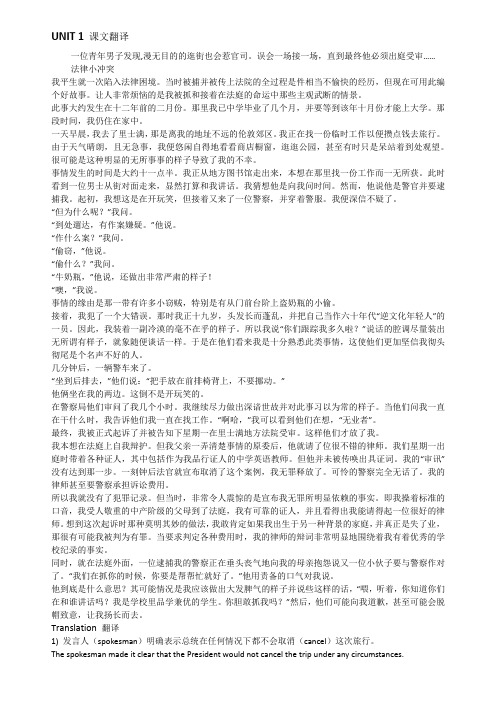
UNIT 1课文翻译一位青年男子发现,漫无目的的逛街也会惹官司。
误会一场接一场,直到最终他必须出庭受审……法律小冲突我平生就一次陷入法律困境。
当时被捕并被传上法院的全过程是件相当不愉快的经历,但现在可用此编个好故事。
让人非常烦恼的是我被抓和接着在法庭的命运中那些主观武断的情景。
此事大约发生在十二年前的二月份。
那里我已中学毕业了几个月,并要等到该年十月份才能上大学。
那段时间,我仍住在家中。
一天早晨,我去了里士满,那是离我的地址不远的伦敦郊区。
我正在找一份临时工作以便攒点钱去旅行。
由于天气晴朗,且无急事,我便悠闲自得地看看商店橱窗,逛逛公园,甚至有时只是呆站着到处观望。
很可能是这种明显的无所事事的样子导致了我的不幸。
事情发生的时间是大约十一点半。
我正从地方图书馆走出来,本想在那里找一份工作而一无所获。
此时看到一位男士从街对面走来,显然打算和我讲话。
我猜想他是向我问时间。
然而,他说他是警官并要逮捕我。
起初,我想这是在开玩笑,但接着又来了一位警察,并穿着警服。
我便深信不疑了。
“但为什么呢?”我问。
“到处遛达,有作案嫌疑。
”他说。
“作什么案?”我问。
“偷窃,”他说。
“偷什么?”我问。
“牛奶瓶,”他说,还做出非常严肃的样子!“噢,”我说。
事情的缘由是那一带有许多小窃贼,特别是有从门前台阶上盗奶瓶的小偷。
接着,我犯了一个大错误。
那时我正十九岁,头发长而蓬乱,并把自己当作六十年代“逆文化年轻人”的一员。
因此,我装着一副冷漠的毫不在乎的样子。
所以我说“你们跟踪我多久啦?”说话的腔调尽量装出无所谓有样子,就象随便谈话一样。
于是在他们看来我是十分熟悉此类事情,这使他们更加坚信我彻头彻尾是个名声不好的人。
几分钟后,一辆警车来了。
“坐到后排去,”他们说:“把手放在前排椅背上,不要挪动。
”他俩坐在我的两边。
这倒不是开玩笑的。
在警察局他们审问了我几个小时。
我继续尽力做出深谙世故并对此事习以为常的样子。
当他们问我一直在干什么时,我告诉他们我一直在找工作。
大学英语精读第三版第3册课后翻译
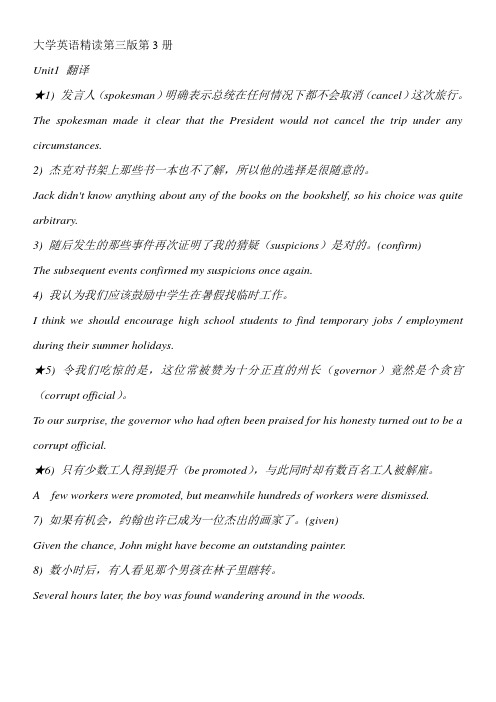
大学英语精读第三版第3册Unit1 翻译★1) 发言人(spokesman)明确表示总统在任何情况下都不会取消(cancel)这次旅行。
The spokesman made it clear that the President would not cancel the trip under any circumstances.2) 杰克对书架上那些书一本也不了解,所以他的选择是很随意的。
Jack didn't know anything about any of the books on the bookshelf, so his choice was quite arbitrary.3) 随后发生的那些事件再次证明了我的猜疑(suspicions)是对的。
(confirm)The subsequent events confirmed my suspicions once again.4) 我认为我们应该鼓励中学生在暑假找临时工作。
I think we should encourage high school students to find temporary jobs / employment during their summer holidays.★5) 令我们吃惊的是,这位常被赞为十分正直的州长(governor)竟然是个贪官(corrupt official)。
To our surprise, the governor who had often been praised for his honesty turned out to be a corrupt official.★6) 只有少数工人得到提升(be promoted),与此同时却有数百名工人被解雇。
A few workers were promoted, but meanwhile hundreds of workers were dismissed.7) 如果有机会,约翰也许已成为一位杰出的画家了。
大学英语精读课程第三册(unit1-5需要背诵部分课文及翻译)
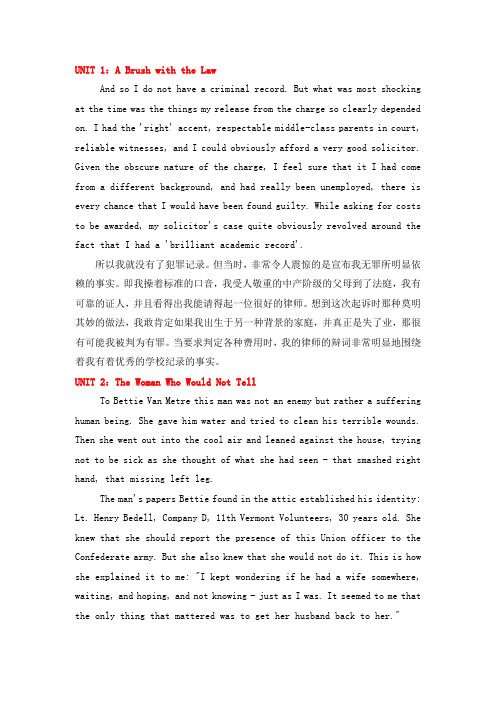
UNIT 1:A Brush with the LawAnd so I do not have a criminal record. But what was most shocking at the time was the things my release from the charge so clearly depended on. I had the 'right' accent, respectable middle-class parents in court, reliable witnesses, and I could obviously afford a very good solicitor. Given the obscure nature of the charge, I feel sure that it I had come from a different background, and had really been unemployed, there is every chance that I would have been found guilty. While asking for costs to be awarded, my solicitor's case quite obviously revolved around the fact that I had a 'brilliant academic record'.所以我就没有了犯罪记录。
但当时,非常令人震惊的是宣布我无罪所明显依赖的事实。
即我操着标准的口音,我受人敬重的中产阶级的父母到了法庭,我有可靠的证人,并且看得出我能请得起一位很好的律师。
想到这次起诉时那种莫明其妙的做法,我敢肯定如果我出生于另一种背景的家庭,并真正是失了业,那很有可能我被判为有罪。
大学英语精读第三版第三册翻译
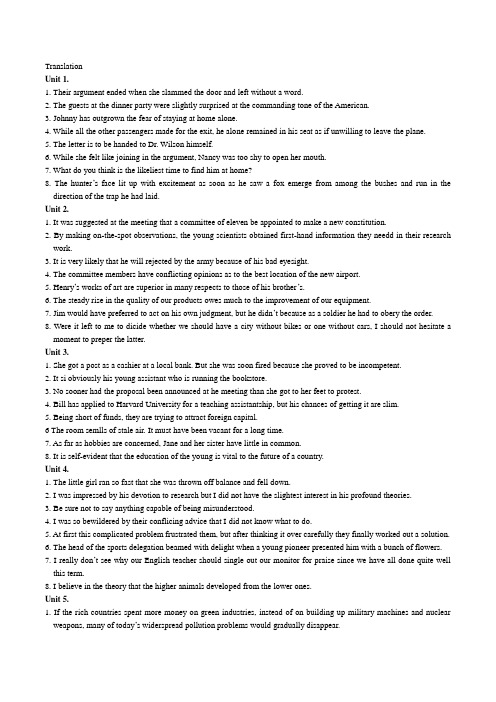
TranslationUnit 1.1. Their argument ended when she slammed the door and left without a word.2. The guests at the dinner party were slightly surprised at the commanding tone of the American.3. Johnny has outgrown the fear of staying at home alone.4. While all the other passengers made for the exit, he alone remained in his seat as if unwilling to leave the plane.5. The letter is to be handed to Dr. Wilson himself.6. While she felt like joining in the argument, Nancy was too shy to open her mouth.7. What do you think is the likeliest time to find him at home?8. The hunter’s face lit up with excitement as soon as he saw a fox emerge from among the bushes and run in the direction of the trap he had laid.Unit 2.1. It was suggested at the meeting that a committee of eleven be appointed to make a new constitution.2. By making on-the-spot observations, the young scientists obtained first-hand information they needd in their research work.3. It is very likely that he will rejected by the army because of his bad eyesight.4. The committee members have conflicting opinions as to the best location of the new airport.5. Henry’s works of art are superior in many respects to those of his brother’s.6. The steady rise in the quality of our products owes much to the improvement of our equipment.7. Jim would have preferred to act on his own judgment, but he didn’t because as a soldier he had to obery the order.8. Were it left to me to dicide whether we should have a city without bikes or one without cars, I should not hesitate a moment to preper the latter.Unit 3.1. She got a post as a cashier at a local bank. But she was soon fired because she proved to be incompetent.2. It si obviously his young assistant who is running the bookstore.3. No sooner had the proposal been announced at he meeting than she got to her feet to protest.4. Bill has applied to Harvard University for a teaching assistantship, but his chances of getting it are slim.5. Being short of funds, they are trying to attract foreign capital.6 The room semlls of stale air. It must have been vacant for a long time.7. As far as hobbies are concerned, Jane and her sister have little in common.8. It is self-evident that the education of the young is vital to the future of a country.Unit 4.1. The little girl ran so fast that she was thrown off balance and fell down.2. I was impressed by his devotion to research but I did not have the slightest interest in his profound theories.3. Be sure not to say anything capable of being misunderstood.4. I was so bewildered by their conflicing advice that I did not know what to do.5. At first this complicated problem frustrated them, but after thinking it over carefully they finally worked out a solution.6. The head of the sports delegation beamed with delight when a young pioneer presented him with a bunch of flowers.7. I really don’t see why our English teacher should single out our monitor for praise since we have all done quite well this term.8. I believe in the theory that the higher animals developed from the lower ones.Unit 5.1. If the rich countries spent more money on green industries, instead of on building up military machines and nuclear weapons, many of today’s widerspread pollution problems would gradually disappear.2. The burning of coal not only consumes the oxygen in the house but also gives out poisonous gases.3. Apparently, finding alternative energy sources is essential to the steady development of our economy.4. Solar cells can absorb sunlight and convert it into electricity.5. If the temperature on the Earth continues to go up from year to year, the polar ice caps will begin to melt and, in all likelihood, half of the buildings in coastal cities will disappear beneath splashing sea waves.6. Because these creatures are small and tend to hide beneath leafy plants, they are not always visible to the naked eye.7. As a result of exposures to atomic radiation, he finally collapsed at work.8. There is distinct evidence of the connection between heavy pressure of work and some disorders of the body.Unit 6.1. As long a you keep on trying, you will be able to resolve this difficult problem sooner or later.2. We anticipate encountering resistance to our plan.( We anticipate that we will encounter resistance to our plan.)3. Jim’s friends said that the noise pollution in their city was terrible, but they had to live with it.4. At first Tom thought that with his knowledge, skill and experience he was bound to find a satisfactory job.5. It would be wise to handle this delicate problem with calmness and patience.6. Dick thought that if he wasn’t able to take the machine apart, chances were that no other worker in the plant could, either.7. Do you think bus drivers should take full responsiblility for the passengers’ safety?8. You needn’t dwell on your mistakes in judgement any more. What’s important is to try your best to avoid repeating them.Unit 7.1. Under the leadership of the local government, the villagers rose to the serious food crisis cause by the floods.2. The exhibition is very popular and is attracting a steady stream of visitors.3. When Mom came upstairs to check on us kids, I turned over and pretended to be asleep.4. Waging a battle against the drug pushers was a challenge to Armstead. She felt rather nervous but she decided to confront them.5. The old lady told me to be cautious and not to talk to the guys hanging out on the street corner.6. A health organization prompted the local government to raise a three-million-dollar fund for a new hospital.7. Opening the door, the man who had set fire to the church found himself confronted by a dozen policemen with guns.8. It is reported that the fire which raged for more than two hours started in an abandoned warehouse.Unit 8.1. Vast amounts of investment have enabled the economy of the area to grow rapidly.2. They lauched a campaign to raise money for a new hospital.3. Success lies in diligence. Dr. Nolen is a case in point.4. Men of high moral standards, they are never to be tempted into taking such expensive gifts.5. There are indications that numerous factories are faced with a very difficult situation.6. The police arrested the criminal on a charge of armed robbery several hours after they found an important clue to his identity.7. Investigation has revealed that retirement tends to cause psychological troubles for some people.8. The medical team did nore than complain about the relatively poor working conditions at the local hospital. For instance, several doctors bought simple medical instruments with their own money.。
大学英语精读3课文(第三版)_中英文对照
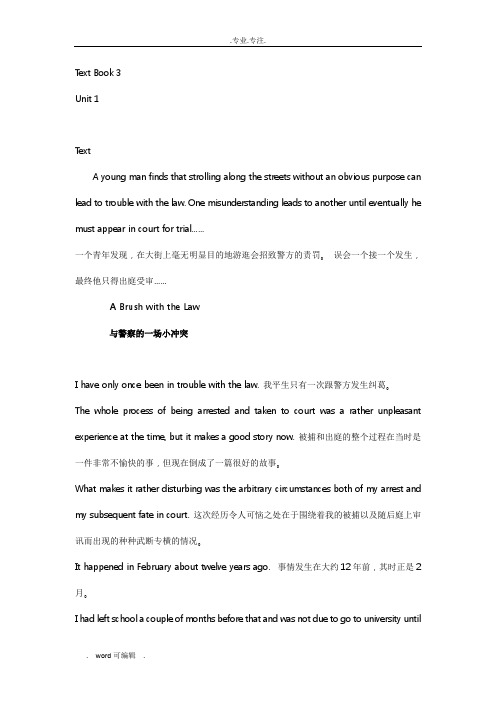
Text Book 3Unit 1TextA young man finds that strolling along the streets without an obvious purpose can lead to trouble with the law. One misunderstanding leads to another until eventually he must appear in court for trial……一个青年发现,在大街上毫无明显目的地游逛会招致警方的责罚。
误会一个接一个发生,最终他只得出庭受审……A Brush with the Law与警察的一场小冲突I have only once been in trouble with the law. 我平生只有一次跟警方发生纠葛。
The whole process of being arrested and taken to court was a rather unpleasant experience at the time, but it makes a good story now. 被捕和出庭的整个过程在当时是一件非常不愉快的事,但现在倒成了一篇很好的故事。
What makes it rather disturbing was the arbitrary circumstances both of my arrest and my subsequent fate in court. 这次经历令人可恼之处在于围绕着我的被捕以及随后庭上审讯而出现的种种武断专横的情况。
It happened in February about twelve years ago. 事情发生在大约12年前,其时正是2月。
I had left school a couple of months before that and was not due to go to university untilthe following October. 几个月前我中学毕业了,但上大学要等到10月。
- 1、下载文档前请自行甄别文档内容的完整性,平台不提供额外的编辑、内容补充、找答案等附加服务。
- 2、"仅部分预览"的文档,不可在线预览部分如存在完整性等问题,可反馈申请退款(可完整预览的文档不适用该条件!)。
- 3、如文档侵犯您的权益,请联系客服反馈,我们会尽快为您处理(人工客服工作时间:9:00-18:30)。
Unit 3一、课文Every teacher probably asks himself time and again: Why am I a teacher? Do the rewards of teaching outweigh the trying moments? Answering these questions is not a simple task. Let's see what the author says.也许每位教师都一再问过自己:为什么选择教书作为自己的职业?教书得到的回报是否使老师的烦恼显得不值得多谈?回答这些问题并非易事。
让我们看看本文的作者说了些什么。
Why I TeachPeter G. BeidlerWhy do you teach? My friend asked the question when I told him that I didn't want to be considered for an administrative position. He was puzzled that I did not want what was obviously a "step up" toward what all Americans are taught to want when they grow up: money and power.我为什么当教师彼得·G·贝德勒你为什么要教书呢? 当我告诉一位朋友我不想谋求行政职务时,他便向我提出这一问题。
所有美国人受的教育是长大成人后应该追求金钱和权力,而我却偏偏不要明明是朝这个目标“迈进”的工作,他为之大惑不解。
Certainly I don't teach because teaching is easy for me. Teaching is the most difficult of the various ways I have attempted to earn my living: mechanic, carpenter, writer. For me, teaching is a red-eye, sweaty-palm, sinking-stomach profession. Red-eye, because I never feel ready to teach no matter how late I stay up preparing. Sweaty-palm, because I'm always nervous before I enter the classroom, sure that I will be found out for the fool that I am. Sinking-stomach, because I leave the classroom an hour later convinced that I was even more boring than usual.当然,我之所以教书不是因为我觉得教书轻松。
我做过各种各样的工作,籍以谋生:机修工、木工、作家,教书是其中最难的一行。
对我来说,教书是个会令人熬红眼睛、手掌出汗、精神沮丧的职业。
说熬红眼睛,这是因为我晚上无论备课备到多晚,总觉得备得还不充分。
说手掌出汗,这是因为我跨进教室之前总是非常紧张,自认为学生一定会发觉原来我是个傻瓜蛋。
说精神沮丧,这是因为我1小时后走出教室时,确信这堂课上得比平常还要平淡无味。
Nor do I teach because I think I know answers, or because I have knowledge I feel compelled to share. Sometimes I am amazed that my students actually take notes on what I say in class!我之所以教书,也不是因为我认为自己能够解答问题,或者因为我有满腹学问,觉得非与别人分享不可。
有时我感到很惊异,学生竟真的把我课上讲的东西做了笔记!Why, then, do I teach?这样说来,我为什么还要教书呢?I teach because I like the pace of the academic calendar. June, July, and August offer an opportunity for reflection, research, and writing.我教书,是因为我喜爱校历的步调。
6月、7月和8月提供了一个供思考、研究和创作的机会。
I teach because teaching is a profession built on change. When the material is the same, I change — and, more important, my students change.我教书,是因为教学是建立在“变”这一基础上的职业。
教材还是原来的教材,但我自身却变了--更重要的是,我的学生变了。
I teach because I like the freedom to make my own mistakes, to learn my own lessons, to stimulate myself and my students. As a teacher, I'm my own boss. If I want my freshmen to learn to write by creating their own textbook, who is to say I can't? Such courses may be huge failures, but we can all learn from failures.我教书,是因为我喜欢有让自己犯错误的自由,有让自己吸取教训的自由,有激励自己和激励学生的自由。
作为教师,我可以自行做主。
如果我想要求一年级学生通过自行编写课本的办法来学习写作,谁能说我不可以那样做呢? 这样的课程也许会彻底失败,但我们都可以从失败的尝试中获得教益。
I teach because I like to ask questions that students must struggle to answer. The world is full of right answers to bad questions. While teaching, I sometimes find good questions.我教书,是因为我喜欢向学生提出必须绞尽脑汁才能回答的问题。
我们这个世界有无穷无尽的正确答案来对付拙劣的问题。
何况我在教学过程中有时也会想到一些出色的问题。
I teach because I enjoy finding ways of getting myself and my students out of the ivory tower and into the real world. I once taught a course called "Self-Reliance in a Technological Society." My 15 students read Emerson, Thoreau, and Huxley. They kept diaries. They wrote term papers.我教书,是因为我喜欢想方设法使自己和我的学生从象牙塔里走出来,步入现实世界。
我曾经开过一门叫做“在工业技术社会里如何自力更生”的课程。
我教的15位学生读了爱默生、梭洛和赫胥黎的作品,记了日记,还写了学期论文。
But we also set up a corporation, borrowed money, purchased a run-down house and practiced self-reliance by renovating it. At the end of the semester, we sold the house, repaid our loan, paid our taxes, and distributed the profits among the group.但除此而外,我们还办起一个公司,借钱买下一所破旧的房屋,通过对这一建筑物的整修翻新,我们就自力更生这一课题进行了一次实践活动。
在期末我们把房子卖掉,还清贷款,缴了税,余下的收益分给了参加实践的学生。
So teaching gives me pace, and variety, and challenge, and the opportunity to keep on learning.所以说,教学使我的工作进程有了规律,使我的生活变得丰富多彩,教学向我提出了挑战,也给了我不断学习的机会。
I have left out, however, the most important reasons why I teach.不过,我要教书的最重要的几个原因还没有讲到呢。
One is Vicky. My first doctoral student, Vicky was an energetic student who labored at her dissertation on a little-known 14th century poet. She wrote articles and sent them off to learned journals. She did it all herself, with an occasional nudge from me. But I was there when she finished her dissertation, learned that her articles were accepted, got a job and won a fellowship to Harvard working on a book developing ideas she'd first had as my student.其中一个原因与维基有关。
维基是我的第一个博士生。
她精力充沛,孜孜不倦地撰写她那篇论述14世纪一位不知名诗人的学位论文。
她写过一些文章,寄给了学术刊物。
